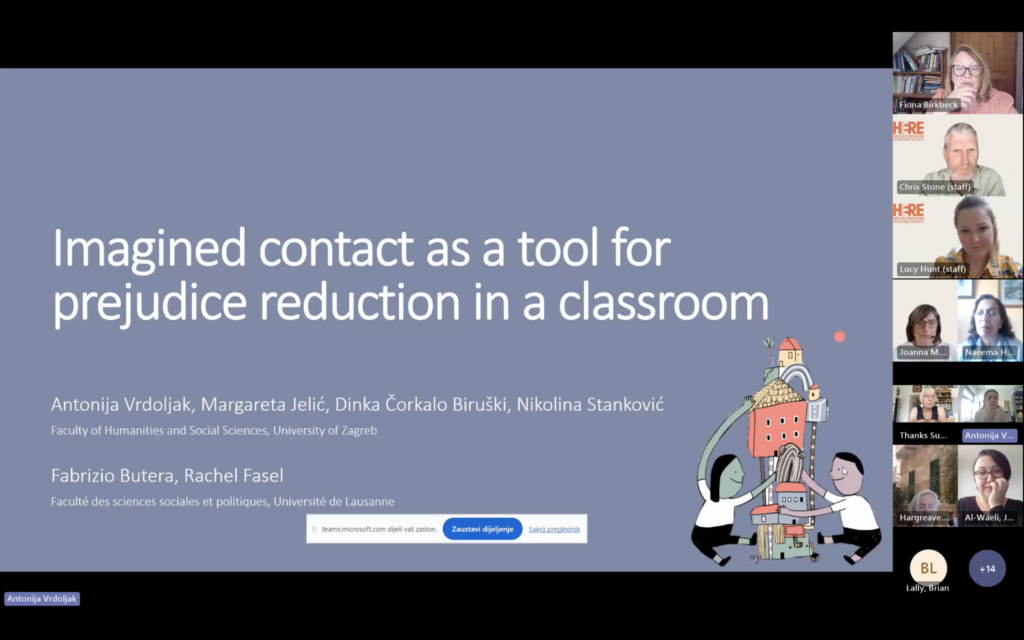On Wednesday 26th June 2024, the Hub for Education for Refugees in Europe (HERE) held our 7th webinar for members of the HERE Network and beyond to share information on a variety of refugee education projects from across Europe. The aim was to extend the critical conversations that were started at the Inaugural HERE Conference in 2022 and our previous networking sessions throughout 2023-4, and to provide a space for teachers, practitioners, academics, researchers and other interested parties to come together to learn, discuss and make connections.
WATCH THE RECORDING

Presentations
The online event involved five lightning presentations:
How do Syrian refugee students tell us they thrive in educational settings?
Brian Lally (Kingston University London); Eleanore Hargreaves (UCL); Jumana Alwaeli (Ulster University)
This presentation introduced participants to the new book, Schooling for Refugee Children. The book includes the findings of research in which we listened to young Syrian refugee students, both in settlements in Lebanon and in London classrooms. Brian Lally provided the context of the Lebanon-based research, provided by a multi-national NGO called MAPs, which runs nine learning centres for Syrian refugee children in the Beqaa Valley and Arsal. Eleanore then illustrated some of the key messages from the children in Lebanon, in which they described aspects of their classrooms that helped them thrive. Jumana then compared these with her findings from the voices of Syrian refugee students now resettled into London schools.
Imagined contact as a tool for prejudice reduction in a classroom
Antonija Vrdoljak (University of Zagreb)
The successful integration of refugee children into schools requires preparing host-society pupils for future intergroup interactions. This talk presents an intervention based on imagined contact that can be used in existing classes before the introduction of a refugee pupil. The program comprises four teacher-led sessions in which students envision interactions with refugee children. It is easily adaptable to specific school contexts, and all materials are freely accessible online. We will also discuss the short- and long-term effects of this intervention on host-society pupils’ attitudes and intentions towards contact with refugee children.
The Art of Understanding
Chris Stone (University of Nottingham)
The Art of Understanding is a research project which brings together experts from the fields of refugee education, language and cultural heritage and young people’s mental health. Through the use of arts-based workshops, we worked with young new arrivals in the city of Nottingham to further our understanding of the ways in which they conceptualise wellbeing and mental health.
The Sanctuary Hub
Leonie Ansems de Vries (King’s College London)
This collaborative project combines research, practice and policy development to create safe pathways into Higher Education for forcibly displaced students and academics from across the world. The project is led by the Sanctuary Team at King’s College London and brings together researchers, practitioners, experts by experience, policy makers and artists.
The TEAMS project (Teaching that Matters for Migrant Students)
Nataša Pantić (University of Edinburgh)
TEAMS project studied how teachers, schools and education systems facilitate migrant integration in schools focusing on teaching practices that create conditions for migrant pupils’ academic learning, socialisation and the development of a ‘sense of belonging’ in their school communities. The project conducted a mixed-method social network analysis in seven secondary schools across three countries (3 in Scotland and 2 each in Sweden and Finland) from September 2020 until March 2023. This presentation we will highlight the findings about teachers’ relational agency – working flexibly with other actors such as English as Additional Language specialists and collaboration with other professionals to support migrant integration.
Links to resources shared during the meeting
- Schooling for Refugee Children (open access volume)
- Vrdoljak et al. (2024)
- Project IRCiS
- Childhood Trauma, War, Migration and Asylum
- Refuge-Ed project
- Refugee Education UK
- Drawing Together project
- King’s Sanctuary Programme
- Politics of Exhaustion: blog post and article
- Video: ‘Même si tu vas sur la lune’
- Video: ‘Raising refugee children’s voices’
- Teaching That Matters for Migrant Students
- Slides: Chris Stone (Art of Understanding project)
- HERE Insights: including recordings and resources from previous networking sessions
- HERE Newsletters
We look forward to meeting together again in autumn 2024. All information on the next event will be shared via our Twitter (@hubHEREeurope) and newsletter (sign up here) – all are welcome!